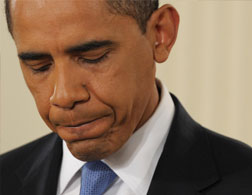Once More, Without Feeling
The GOP's misguided and confused campaign against judicial empathy.
By Dahlia Lithwick
Updated Monday, May 11, 2009, at 7:15 PM ET

One is surely entitled to say that President Obama's repeated claim that he seeks "empathy" in a replacement for Justice David Souter is something less than a crisp constitutional standard. But the Republican war on empathy has started to border on the deranged, and you can't help but wonder to what purpose.
Webster's defines empathy as "the experiencing as one's own the feelings of another." Obama, in The Audacity of Hope, described empathy as "a call to stand in somebody else's shoes and see through their eyes." To Obama, empathy chiefly means applying a principle his mother taught him: asking, "How would that make you feel?" before acting. Empathy in a judge does not mean stopping midtrial to tenderly clutch the defendant to your heart and weep. It doesn't mean reflexively giving one class of people an advantage over another because their lives are sad or difficult. When the president talks about empathy, he talks not of legal outcomes but of an intellectual and ethical process: the ability to think about the law from more than one perspective.
But Republicans have gathered up their flaming torches and raised their fists to loudly denounce empathy and all empathy-based behavior as evil. Last Friday, RNC Chairman Michael Steele, sitting in for Bill Bennett on the Morning in America syndicated radio show, blurted out, "Crazy nonsense empathetic! I'll give you empathy. Empathize right on your behind!" Nice.
Sen. Orrin Hatch of Utah, speaking on This Week, warned that if a jurist were to show empathy, "politics, preferences, personal preferences and feelings might take the place of being impartial and deciding cases based upon the law, not upon politics." In an opinion piece in the Washington Times warning that Obama is poised to be the "first president to make lawlessness an explicit standard for Supreme Court Justices," Wendy Long of the Judicial Confirmation Network saw empathy as a kind of temporary insanity that so distorts a jurist's vision as to make it difficult "to uphold the federal judicial oath to dispense justice impartially." Over on Fox News, Sean Hannity warned that empathy is the first step toward "social engineering." And in a delicious Freudian slip, Sen. Jeff Sessions of Alabama snorted: "I don't know what empathy means."
You don't say.
When did the simple act of recognizing that you are not the only one in the room become confused with lawlessness, activism, and social engineering? For a group so vociferously devoted to textualism and plain meaning, conservative critics have an awfully elastic definition of the word empathy. It expands to cover any sort of judicial malfeasance they can imagine. Empathy�the quality of caring what others may feel�signals intellectual weakness, judicial immodesty, favoritism, bias, and grandiosity. John Yoo also seems to be of the view that the kind of emotional incontinence that begins with empathy for others quickly leads to being "emotive" on the bench. Evidently it's a short hop from empathy to having the judicial vapors.
But as used by the president, the word empathy does not strike me as "code" for anything. I don't believe he used it as a proxy for female or for varied life experiences or for something that exists outside of the law at all. Oh, and empathy�at least as Obama has used the word�decidedly does not mean favoring only the poor, women, or minorities in every dispute. Again quoting from The Audacity of Hope: "Empathy � calls us all to task, the conservative and the liberal, the powerful and the powerless, the oppressed and the oppressor. We are all shaken out of our complacency. We are all forced beyond our limited vision."
more...
http://www.slate.com/id/2218103/pagenum/all/#p2